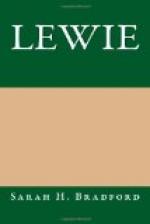When Mrs. Wharton kissed Emily for good-bye, and told her to be a good girl, and take care of her health, she little imagined the suffering through which her gentle niece was to pass before they met again. No one dreamed of it but Agnes.
The next day, in answer to a message from Emily, the physicians came. They found her courageous and cheerful; for she was sustained by an arm all-powerful. Strength was given to her for the day and the occasion; a wonderful fortitude sustained her; and the precious promise was verified to her—“When thou goest through the waters, I will be with thee.”
And Agnes, who sat with one hand over her eyes, and the other clasping that of Emily, knew only by a sudden and long-continued pressure of the hand that the knife was doing its work. There was not a groan—only one long-drawn sigh—and it was over; and the result was better than their most sanguine hopes.
Mrs. Wharton returned, after an absence necessarily prolonged to some weeks. She found Emily sitting on the sofa, looking much as she had done when they parted; and it was not till long afterward that she discovered what had been the cause of Emily’s illness, and learned how much she had endured. She understood many things now which had been mysteries to her before, realizing, in some degree, the torment of mind and body through which this gentle one had passed, and the reason of the bidding down of the tenderest feelings of her heart.
Poor Emily! None but He who seeth in secret had known the agony which wrung thy loving heart to its very depths, causing even the keen torture of physical suffering to be at times forgotten. But He can, and He does, give strength for the occasion, whatever it may be, and however sore the trial; and leaning on His arm, His people pass securely through fires of tribulation, which, in the prospect, would seem utterly unendurable, and come out purified, even as gold from the furnace.
X.
The Tutor and the Pupil.
“Untutor’d lad, thou art too malapert.”—HENRY VI.
Mr. Wharton had endeavored to give Mr. Malcolm a correct understanding of the nature of the case he was about to undertake, in becoming the instructor of the spoiled and wayward Lewie. He told him of his natural good qualities, never suffered to develop themselves, and of the many evil ones, fostered and encouraged by the unwise indulgence of his fond and foolish mother. And yet, when the young clergyman had fairly entered upon his duties as tutor at the Hemlocks, he found, that “the half had not been told him.”
Lewie chafed and fretted under the slightest restraint, and had not the remotest idea of doing anything that was not in all respects agreeable to his own inclinations. The idea of compulsion was so new to him, that he was overwhelmed with amazement one day, when his tutor (after trying various means to induce him to learn a particular lesson) finally told him that that lesson must be learned, and recited, before he could leave the library. Master Lewie, fully determined in his own mind to ascertain whose will was the strongest, and whose resolution would soonest give out, now openly rebelled, and informed his master that “he would not learn that lesson.”




